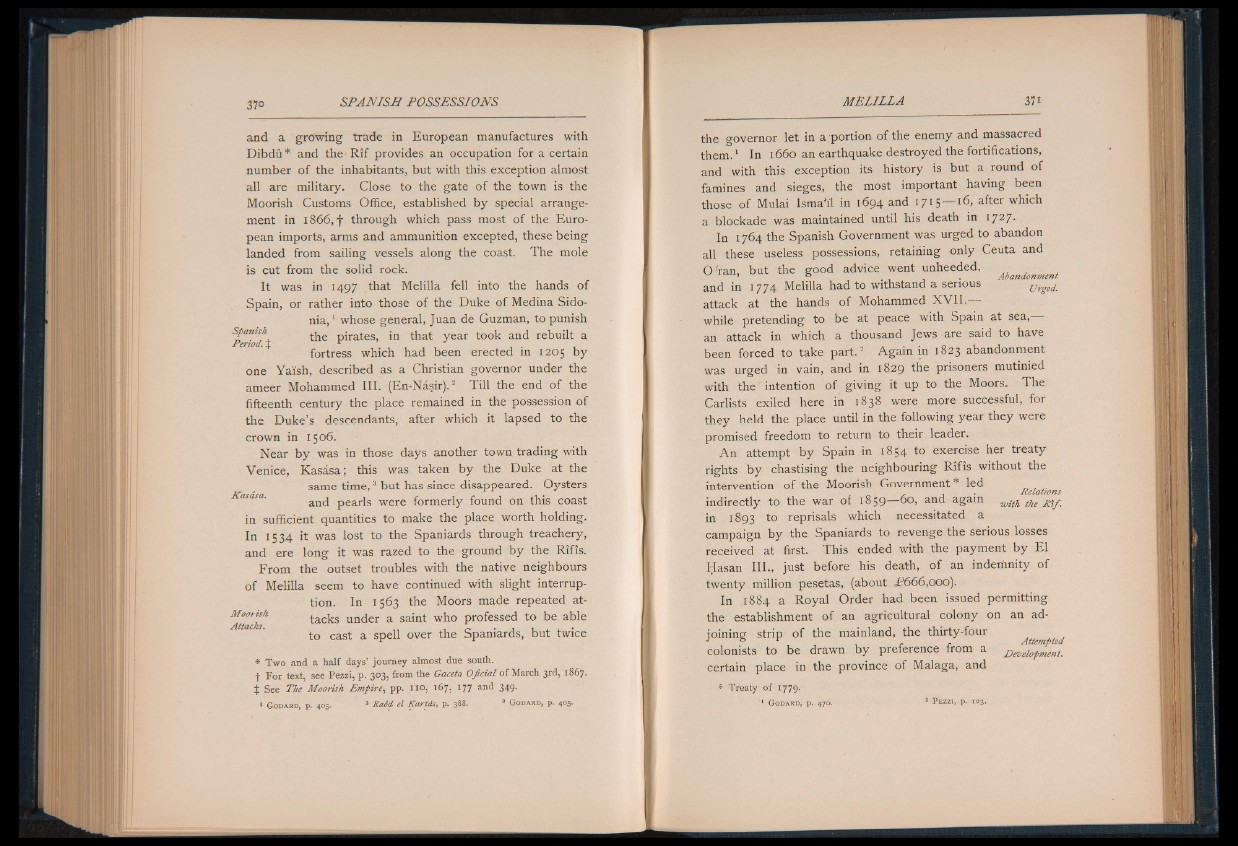
and a growing trade in European manufactures with
Dibdu * and th e Rif provides an occupation fo ra certain
number of the inhabitants, but with this exception almost
all are military. Close to the gate of the town is the
Moorish Customs Office, established by special arrangement
in 1866, f through which pass most of the European
imports, arms and ammunition excepted, these being
landed from sailing vessels along the coast. The mole
is cut from the solid rock.
It was in 1497 that Melilla fell into the hands of
Spain, or rather into those of the Duke of Medina Sidonia,
1 whose general, Juan de Guzman, to punish
Spanish ^ p jra te s jn that year took and rebuilt a
Period. % r
fortress which had been erected in 1205 by
one Yai'sh, described as a Christian governor under the
ameer Mohammed III. (En-Nasir).3 Till the end of the
fifteenth century the place remained in the possession of
the Duke’s descendants, after which it lapsed to the
crown in 1506.
Near by was in those days another town trading with
Venice, Kasasa; this was taken by the Duke at the
same time,3 but has since disappeared. Oysters
and pearls were formerly found on this coast
in sufficient quantities to make the place worth holding.
In 1534 it was lost to the Spaniards through treachery,
and ere long it was razed to the ground by the Rifis.
From the outset troubles with the native neighbours
of Melilla seem to have continued with slight interruption.
In 1563 the Moors made repeated at-
^AttMks tacks under a saint who professed to be able
to cast a spell over the Spaniards, but twice
* Two and a half days’ journey almost due south.
t For text, see Pezzi, p. 303, from the Gaceta Oficial of March 3rd, 1867.
4 See The Moorish Empire, pp. 110, 167, 177 an(i 349-
1 G o d a r d , p . 4 0 5 . 1 R a id el K artds, p . 388. 3 G o d a r d , p . 405 .
the governor let in a portion of the enemy and massacred
them.1 In 1660 an earthquake destroyed the fortifications,
and with this exception its history is but a round of
famines and sieges, the most important having been
those of Mulai Isma‘il in 1694 an£f after which
a blockade was maintained until his death in 1727-
In 1764 the Spanish Government was urged to abandon
all these useless possessions, retaining only Ceuta and
O'ran, but the good advice went unheeded, a f a g j
and in 1774 Melilla had to withstand a serious Urged_
attack at the hands of Mohammed X V II.—
while pretending to be at peace with Spain at sea,
an attack in which a thousand Jews are said to have
been forced to take part." Again in 1823 abandonment
was urged in vain, and in 1829 the prisoners mutinied
with the intention of giving it up to the Moors. The
Carlists exiled here in 1838 were more successful, for
they held the place until in the following year they were
promised freedom to return to their leader.
An attempt by Spain in 1854 to exercise her treaty
rights by chastising the neighbouring Rifis without the
intervention of the Moorish Government * led
, , Relations
indirectly to the war of 1859— 60, and again with the
in 1893 to reprisals which necessitated a
campaign by the Spaniards to revenge the serious losses
received at first. This ended with the payment by El
Hasan III., just before his death, of an indemnity of
twenty million pesetas, (about £666,000).
In 1884 a Royal Order had been issued permitting
the establishment of an agricultural colony on an adjoining
strip of the mainland, the thirty-four
. c r Attempted
colonists to be drawn by preference from a DeveiopmenL
certain place in the province of Malaga, and
* Treaty of 1779.
1 G o d a r d , p . 4 70 . 2 P e z z i , p . 1 2 3 .